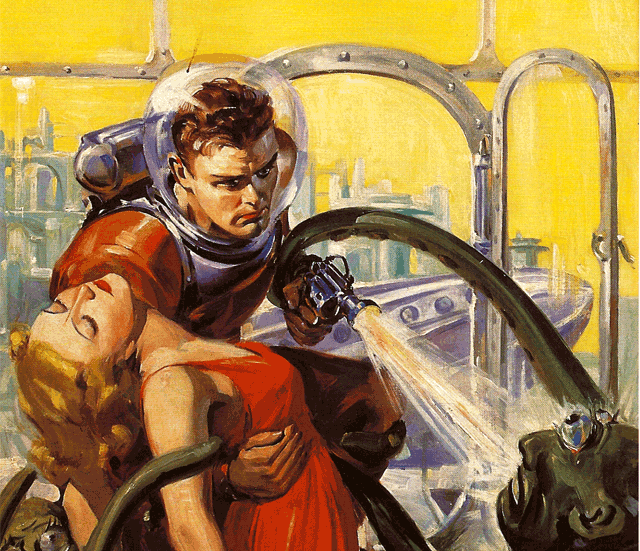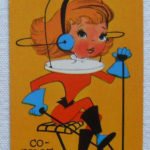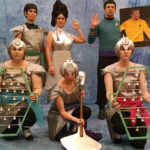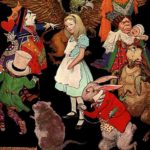A March of Stereotypes
Last week, Becky Miller discussed the tendency of modern SF to stereotype women as aggressive protagonists who do what men do, only in heels. Her well-made points turned my thoughts to the treatment of women in speculative fiction. The portrayal of women has varied greatly from era to era and from author to author. It even varies from science fiction to fantasy; fantasy – built up from tales crowned with queens, fairies, and witches – possesses deeper traditions of vital female characters. Yet taking a broad view of speculative fiction, and especially of science fiction, we may discern the march of female stereotypes.
 The reigning stereotype of early sci-fi was the young lady, invariably attractive, who was the love interest of the young hero, or the daughter of the old professor, or – this was not rare – both. Often, this young woman played Watson to the men’s Sherlock, asking what the audience doesn’t know. Thus the woman provided a method to resolve the eternal writer’s problem of the info-dump, and an infinitely more graceful one than having the hero and the professor tell each other what both already know. More significantly, the young woman is usually the story’s heart – the hero’s inspiration and the center of his emotion. Often enough, she is the damsel in distress, awaiting rescue. In short, early sci-fi stereotypes fit women into classic ideals of femininity, though it must be noted that this did not wholly sideline women from the action. It was not unusual for the hero’s love interest to accompany him into peril, nor unknown for her to use a weapon when the crisis demanded it.
The reigning stereotype of early sci-fi was the young lady, invariably attractive, who was the love interest of the young hero, or the daughter of the old professor, or – this was not rare – both. Often, this young woman played Watson to the men’s Sherlock, asking what the audience doesn’t know. Thus the woman provided a method to resolve the eternal writer’s problem of the info-dump, and an infinitely more graceful one than having the hero and the professor tell each other what both already know. More significantly, the young woman is usually the story’s heart – the hero’s inspiration and the center of his emotion. Often enough, she is the damsel in distress, awaiting rescue. In short, early sci-fi stereotypes fit women into classic ideals of femininity, though it must be noted that this did not wholly sideline women from the action. It was not unusual for the hero’s love interest to accompany him into peril, nor unknown for her to use a weapon when the crisis demanded it.
Another, less genteel stereotype is typified by the women of the original Star Trek – the Federation servicewomen in miniskirts and the endless parade of female aliens who probably were not warm under those lights. Unlike the vaguely Victorian women of earlier sci-fi, those women were allowed to enter the story in their own right, not needing a personal relationship with a male character for admission. At the same time, their presentation – sexualized in the very teeth of common sense – objectified them in a way that the idealized women of a more old-fashioned tradition were not. This stereotype was probably most prominent between the fading of the old ideals and the dominance of the new, but it existed before then and is not extinct now.
The stereotype now ascendant is that of the action heroine, whose prowess defies old notions of feminine weakness and, at times, the laws of nature. Princess Leia is the embodiment of the new SF heroine: assertive, authoritative, confident in the use of weapons and in everything else, sarcastic and sharp-tongued to the point of being obnoxious. (If anyone disagrees with this last statement, let me just say: Get this walking carpet out of my way.) We want a heroine who can scrap with the biggest, toughest of men, and due to standards of female beauty strictly enforced in Hollywood, we are accustomed to heroines who do this while weighing just north of 100 pounds.
But despite this and other absurdities, there is nothing inherently wrong with the confident, sarcastic woman who knows how to make use of an arsenal. For that matter, there was nothing wrong with the sweetheart or daughter who is the hero’s heart. (The female military officer in a miniskirt we can do without.) The real error of this march of stereotypes is not that speculative fiction features a certain kind of woman, but that it neglects other kinds.












































I think it’s also partly a matter of how they’re written. So many character types/behaviors become unacceptable when the behaviors aren’t substantiated, well written, or detailed enough to make the audience care about the character.
One example is Haruno Sakura’s character arc in Naruto and Naruto Shippuden. Her character arc of being a shy, booksmart girl that was weak on the battlefield and too obsessed with the boy she had a crush on is, in many ways, a compelling character arc because she learns to put all that aside and become a strong and capable person. But the way her character arc was paced, especially in the first Naruto series, made her extremely annoying on multiple occasions. The extent of her uselessness during conflicts wasn’t written in a way that was understandable or realistic further down the road, and that made her insanely annoying to a lot of people and probably made her serve as an example of bad female stereotypes in fiction. It’s hard to explain, but one of the issues was that she didn’t make the right types of progress fast enough, so inwardly, the audience’s reaction was often ‘Come on Sakura, you’ve been in these situations often enough that you should have at least a vague idea of how to be useful by now…’
Good job laying that out. Totally agree with your conclusion. There are so many restrictions on what a female character can be, not just in spec fiction, but most all fiction, stories, movies, TV shows.
This is a discussion that is worth exploring further. Hope Autumn and I aren’t the only ones to leave a comment here.
Welp, I already said my piece about non-nurturing women and subverting the “women’s work” tropes on an earlier article.
I’d kinda like to see a survivalist story about a community rather than the loner, with much less emphasis on toxic-masculine tropes about aggression and fighting and more about cooperation and, dare I say it, women’s work. It could be more exploring humanity by means of its origins in hunter-gatherer groups and early agriculture. Heck, we could steal a page from Navajo society and have the lineage traced by the maternal line, with the male inheritance be maternal uncle-nephew. (yaaaas hamstring the patriarchy around sexual control) At some point I would probably need a plot, but it could be mostly slice-of-life.
(Escapist hippie fantasy? okayfine, pretty much.)
I think that’d be interesting from a setting standpoint, though it’d probably be pretty hard to have a plot without someone being toxic at some point, even(or perhaps even especially) in a slice of life plot, where everything revolves around interpersonal relationships, which are bound to get bad now and then. Plus, slice of life tends to rely, in part, on interpersonal drama.
When you say community, rather than the loner, what are the parameters for that, though? A lot of survival stories I’ve seen tend to involve two or more people. Around when I was in third grade my favorite book was The Swiss Family Robinson, which involved a large family surviving on an island. Good story, and from what I recall people weren’t really being toxic to each other, but then the characters weren’t deep and interesting, and many aspects of the story felt unrealistic, so there are still some aspects of it that are lacking.
Welp, two people aren’t a community. Three people aren’t really one, either. A single family, even if it does have a dozen kids, is not really a community, either. Granted, I was thinking mostly about video games, but there are a few survivalist movies that use the loner trope.
The Road (I read the book, I haven’t seen the movie) has a dad and his kid. There’s also that Will Smith movie I Am Legend, where he has the dog, but that’s not community, either. There’s that Liam Neeson vs wolves in the Frozen Wastelands of the North movie that I can’t be arsed to remember the name of. I’d argue that it’s a uniquely American trope, the rugged loner who survives in the wilderness. We certainly had a lot of wilderness to practice it in. It’s also a staple trope of the western. Oh! Also the Mad Max movies, ol’ Max’s lonerism is generally shown as superior to whatever effed up community he comes across.
The Walking Dead is closer to the community stuff, but it’s more about violence (prolly ’cause zombies) and toxic masculine stuff like that (bias admission: I stopped watching after they got to the prison because it was getting pretty boring). But there are other flavors of dysfunction and toxicity besides toxic masculinity. Can we have some variety? Zombies are passe at this point (I am super tired of zombies), and I only ever saw them scavenging rather than learning to make stuff. Go to the library and read the Foxfire books, for glob’s sake. (Survivalist stories NEED MOAR LIBRARIES)
I guess depending on some definitions I agree that it makes sense to say that just two people aren’t a community(or that even a small group isn’t) So is community being defined here as more than one family/multiple non related people living together? That makes sense I guess, unless we’re talking about a family that gets large enough to become a clan or tribe or whatever.
Have you read The Girl Who Owned A City by O T Nelson? It’s about a community of kids learning to survive after everyone over the age of 12 dies. They at least somewhat reference learning skills from books/a library, and the story can be fun to discuss from a philosophical standpoint. Plus, there are no zombies present 🙂
Also…I feel a bit silly for asking, but what constitutes the maternal uncle and nephew relationship? Like, how are they related/not related? I kind of like exploring and learning about different ways inheritance and ranks get passed down, though the most common ones I write are more egalitarian ones(with my angel descendant chars, territories are usually passed down to eldest child, rather than eldest son. And when it comes to more militaristic societies I write, rank is usually based on skill, leadership abilities, etc.)
I Am Not a Sociologist, but I’m distinguishing between a community and a large family because family dynamics have a bunch of stuff (like dependency) that makes it different from regular community dynamics.
I come from the sort of place where I’m related to half of the two neighboring towns, and IME, there’s a different feel between just the regular crowd drinking coffee at the mini-mart and the distant cousins that we don’t really talk to because none of their kids are near our age and also there was some sh*t over inheritance when great-grandma passed away (true story, y’all, my dad still might be carrying that chip on his shoulder). Also there was that time when one cousin was the mayor and there was some sh*t about a city computer he had been holding in his home and my great-uncle wrote passive-aggressive notes about governmental transparency by means of letters to the editor of the nearest local paper. (resigned sigh)
ANYway, as for maternal lineage, some cultures trace bloodlines through the mother’s side (because while fatherhood may be iffy, motherhood is a LOT easier to determine). In Navajo culture, a boy’s mom’s brother was an important male figure and mentor in his life. IDK if it went to the extent of inheriting property, but in fiction we can explore that option.
And you always know that you’re related to the other kids your own mom birthed, so passing down property to your sisters’ kids would ensure that it stayed in the family with much less drama than passing down property on the father’s side, whether due to infidelity or questions of legitimacy. Legitimacy, after all, was mostly about inheritance, that the b*stards (in the old sense) wouldn’t inherit what the legal children rightfully owned.
Theoretically, at least, a matriarchal-lineaged society would be less repressive and misogynistic about sexual issues because it took away the option that a cuckold would have to give his property to kids that weren’t his own, which he might object to. (There are plenty of other ways it could have been misogynistic, but the state of the marriage market [or lack thereof] is definitely an important part of worldbuilding.)
Also, while primogeniture is the most common model of property inheritance, but I think some of Russian society actually passed the farm to the youngest, while they supported the older ones in a career or gaining property of their own throughout their lifetime (the youngest being the one they could do for the least).
That’s actually a pretty interesting reason for a matrilineal inheritance. Not sure what happens if a woman is barren, though, aside from maybe adopting or passing her inheritance on to a sibling’s kid. Or what happens if the mother is an only child(meaning her sons wouldn’t have an uncle to inherit from) Something to look into I guess. Or maybe just explore the heck out of in a story some day.
Didn’t know that about Russia, but it sounds interesting and kinda makes sense.
I think another interesting culture when it came to property inheritance was ancient Hebrew culture, when it came to how property rights worked. From what I recall, a woman could still inherit land in that culture as well, if her father didn’t have any sons. I kind of want to write about a culture that uses a lot of ancient Hebrew property and inheritance ideas, because it would be fun and different to explore.
I can also imagine a lot of fascinating things that could result from a woman inheriting property in that scenario(I would guess that if a man that was the eldest in his family and thus the heir of his family’s property married a woman that inherited all of her father’s property, their eldest son would inherit the properties of both his parents. So that could be a strategic way to increase the wealth of both their families)
Now that I think about it, it’s interesting that you brought up I Am Legend. I agree that he and the dog aren’t a community, but in a way I think it’s a bit different than some of the other post apocalyptic stuff you mentioned(haven’t seen Walking Dead, though, so I’m just going off things I’ve heard about it) But one thing about the guy in I Am Legend is that he didn’t want to be alone at all. He only stayed back to find a cure for the good of humanity, and because his family died and he doesn’t really have much to return to.
And then when he meets the lady and her son, they try to bring the cure to a community of people that have survived up ’til now. So, from what I recall, I Am Legend kind of does a good job of making solitude look miserable and paints society as a good thing, or at least a step up from being alone and in danger. Never quite thought of the show that way.
Speaking of Star Trek, I would like to pitch a fanbase remake of Voyager (if I could draw, I’d make it graphic novelish). It had good parts, but there was a lot of storytelling farts in it. There’s a hundred forty-some people on the ship, and we regularly see about a dozen. Wasted opportunity. Too many humans, but quite a few female characters to work with, too.
Make Janeway a little more consistent (and more consistently interesting). Stop giving me reasons to yell WHAT TRIBE IS THAT, CHAKOTAY at the screen or reasons to wish Neelix and/or Tom Paris out an airlock. 9/10 for Tuvok, pls more Tuvok, but pls stop having the majority of his episodes spent as Neelix’s foil. Kes was meh to boring, pls do better. Same with Harry Kim. I like B’Elana Torres, especially when she got less annoying after the first season. Pls more competent B’Elana.
And Seven of Nine. (Resigned sigh), oh Seven. Character-wise, she was pretty okay, we just need to cut back 50-60% of the fanservice. Also, have them pick up more alien frens (who are not like Neelix) along the way. Maybe just to drop them off later (or much later), but it’s another wasted opportunity if you don’t.
The problem, as I see it, really is more centered in writers’ desire to use characters as chess pieces rather than draw “real” people who grew the way they are from life experiences.
Today I read the newest chapter of a Tapas webcomic called Prince Of Silk And Thorn, and it reminded me of another example of the characterization stuff I mentioned earlier.
The main female char of that story(and many female leads written by the same author) seem arrogant in an annoying way. Like, more annoying than the Princess Leia thing mentioned in this article. The female char I’m talking about just sort of seems to make random prideful statements and throws little fits sometimes when things don’t go her way. Sometimes there’s a reason for her to be upset(her fiance is kind of rude when she first meets him, so it makes sense for her to be angry at him) But her anger, or at least the extent to which she expressed it, seemed a bit out of proportion. Understandably, her fiance says he dislikes her, which just outrages her more(which is hypocritical since she doesn’t like him either and is initially trying to manipulate him for her own gain)
I like my fair share of arrogant chars(Ianna from the Tapas comic Adonis can be kind of arrogant at times) But the arrogance should feel like a natural response to everything around them. Ianna is part goddess, and grew up in a very toxic family, and we actually see some of its effect on her pretty vividly, so it’s easier to feel that her behavior arises from a mixture of power and a dangerous, unhealthy childhood.
Maybe another reason I like Ianna better is because she doesn’t spend as much time bragging and tends not to look down on someone unless they’re harassing her or someone else in some way. She does things like get frustrated at not being able to find someone that matches her skill, but after everything else in the story that sentiment almost feels understandable.
Inanna? (I forget how to spell her name) That’s the Mesopotamian goddess who was married to some dirt-farmer-peasant-type god and was pissed about it. But later there was some pretty risque text about them getting it on, a la Song of Songs, except with less imagery about goats.
But yeah, the Ojou-sama type of character has to work pretty hard to get me to like them.
I don’t know if they were trying to base it off of Mesopotamian mythology or not, though so far it sounds wildly different from the myth you mentioned. In some ways the story feels like a somewhat medieval society crossed with some more ancient Japanese or Korean ideas. The beginning of the story shows Ianna dying, then getting reincarnated into her childhood self, for instance. Ianna is also the daughter of her father’s second wife/concubine, and I think by the medieval time period in Europe polygamy wasn’t as much of a thing? But then we have castles and nobility and magic and mythical creatures that could have easily come out of the average European themed medieval fantasy.
Have there been any Ojou-sama type characters that you have liked, then?
There are definitely swings in the popular model of female characters… but I wonder if readers would actually enjoy a tale about a sumo-wrestler type girl, who thinks long and hard before she hurts anyone’s feelings, but can crush a skull with her bare hands?
That’s a question I’ve asked… just because it hasn’t been done, doesn’t mean people would like it if it was.
Also, the reason tropes get run into the ground is because they are so popular with their audience! (Most of the times.)
So I’ve tried to make my Fia Brithin character a bookish, dedicated, “out of her depth” girl who is slowly spurred to greater daring by a deep seated sense of obligation in the face of the dangerous neighboring conflict.
But she is slim, and not “extremely pretty”, but has a couple of fellows flattering her from time to time… so is she really THAT different…?
I’m not sure what the answer is for the whole concept!!!
(Also, what about age? I’m kind of tired of the teenagers doing everything… but the no one wants to read about grandmas or 30/40 year old mothers/aunts out to bring justice to the world! 😉 )
I think some of that has to do with species and life span things. What I like to do with a lot of my chars (regardless of gender) is show large spans of their life, so it isn’t uncommon for part of their story to take place when they are young and end much later in their lives, and they are accomplishing things throughout that time. But part of the reason they are able to do that, even in more combat style roles, is because my chars tend to be capable of longer life spans due to some reason or another. Many of my angel descendant chars are capable of living up to a thousand years, though many of them are killed off at least a few centuries beforehand due to disease, territorial disputes, etc.
As for regular human chars…I think many people would be willing to read about older chars, so long as they have something interesting and compelling to do. The cast of Fate Zero was mainly comprised of adults, but it was still a very compelling story because we are caught up in who the characters are, what their mission in life is, and how they cope with the more ghastly aspects of existence and the war they signed up for. And then there’s stories like Naruto, Naruto Shippuden, and Boruto, which has lot of adult characters, and where we are basically watching all the children characters grow up.